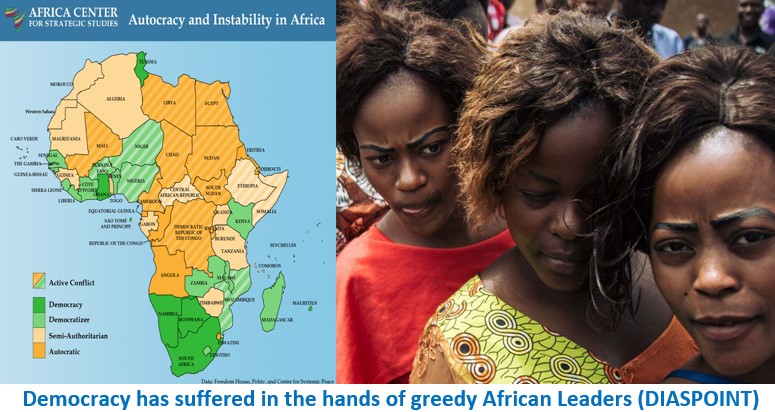Is Africa finally seeing the rise of Afrocrats and Afrocracy?
Post By Diaspoint | July 11, 2023

By Julius Nyambur
If there is ever formidable attestation that Africans are tired of autocratism and yet have become prejudiced to perpetually putting up with the burden of hijacked democracy, then one needs not look further but at the face of the triple events that just unfolded in Algeria, Sudan, and Mali within a span of less than three months.
Citizens’ resolve and pressure in the three countries all north of the Equator resulted in the heads of state and government officials reluctantly vacating office, thereby paving way for new political dispensations.
Characterised by sustained and unwavering protests and sit-ins that have been largely non-violent in content and scope, these unique uprisings point to a new trajectory that could herald a political system of embraceable genre, across continental Africa.
Granted, this prompts the question: Is Africa experiencing a new and innovative awakening?
Dispensational awakening does not occur quite often but when it does, it commands societal and ideological restructuring.
Africans, in particular, have had enough of both dictatorship and democracy.
Democracy, in all its variant shades and machinations, has not apparently produced appreciable outcomes as far most African countries are concerned.
Its upholding and periodic rituals have instead proved to be subject to manipulation, chaotic, and oftentimes engender constant fragility than peace, security and development.
In contrast, dictatorship—benevolent or malignant—has seemingly reached its point of diminishing returns, as demonstrated by the cases of Sudan and Algeria.
For nearly 30 years, Sudan has been ruled by one brutal autocrat, Omar al-Bashir, who first came to power through an Islamic-backed coup in 1989.
Thereafter, he progressed by rigging elections and institutionalised Sharia law.
However, on April 11, 2019, his reign tumbled when a combination of factors conspired against him.
The good news is that the ouster was less costly in terms of human life and property losses, making an extraordinary departure from the usual killings that have become instinctively Africa. Impressive has the revolution been, thus closely watched continentally, if not globally.
Suffices to deduce that whereas this approach is not entirely maiden (there were previous uprisings in 1964 and 1985) to Sudanese people, its successful impacts are certainly more likely to be replicated near and far. Here is why:
Read More from original source
